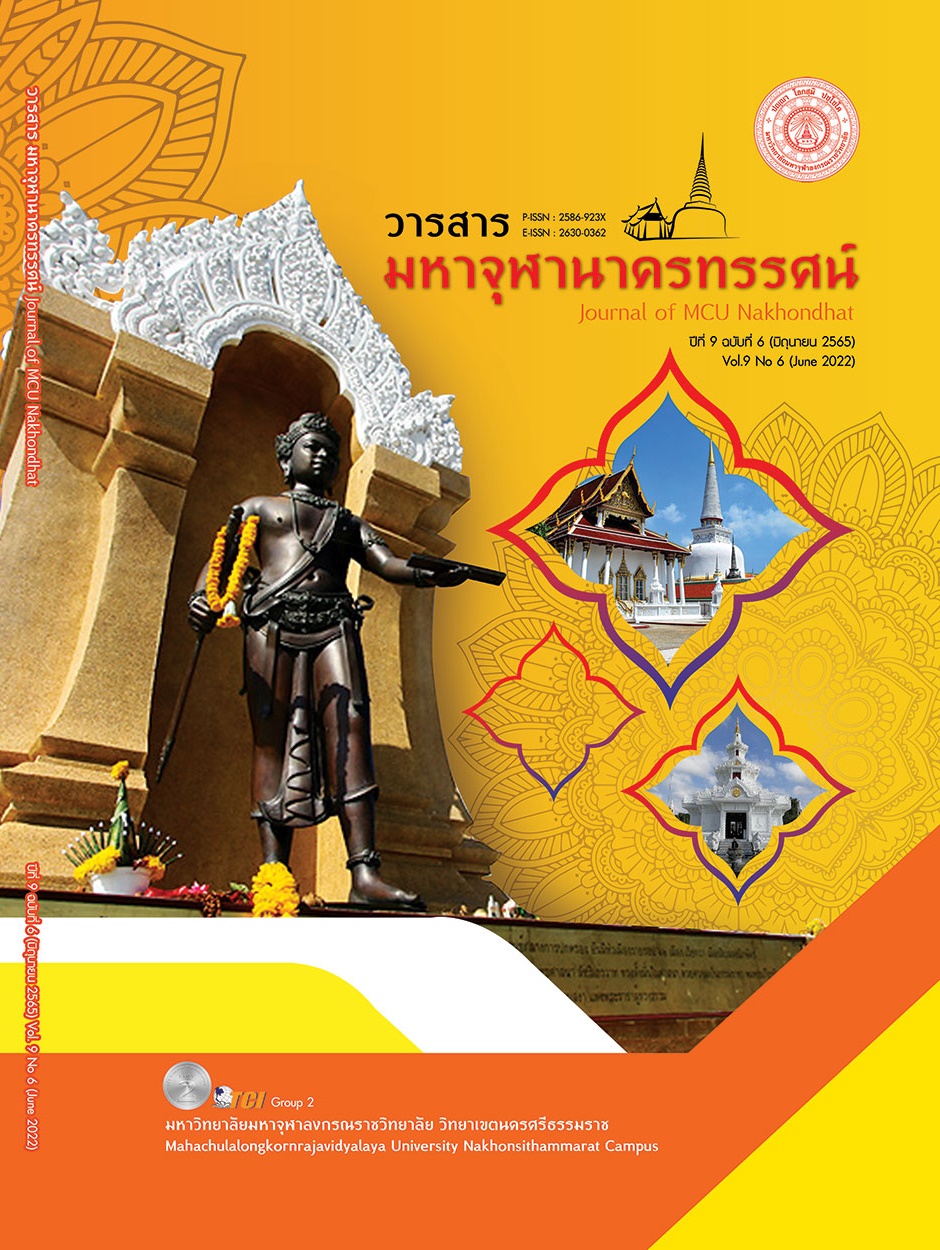THE DEVELOPMENT OF LEARNING ACHIEVEMENT AND THE ANALYTICAL THINKING ABILITY USINGPROJECT-BASED LEARNING OF THAILAND FINANCIAL AND ECONOMIC INSTITUTE FOR MATTHAYOMSUKSA 1 STUDENTS
Main Article Content
Abstract
The Objectives of this research article were to 1. develop a project-based learning management plan for developing academic achievement and analytical thinking. 2. compare the academic achievement of students studying with a project-based learning management plan in regard both pre-test and post-test, and compare the analytical thinking abilities of students studying with a project-based learning management plan both pre-test and post-test, 3. study the satisfaction of students towards project-based learning management. The sample consisted of 16 students in Mathayomsuksa 1, Muen Si Wittayanusorn Sports School, which were obtained by cluster sampling. Research instruments were: 1. Project-based learning management plans financial institutions and Thailand economy, amounting. 2. An achievement tests. 3. Analytical Thinking Ability Test. 4. Satisfaction Questionnaires. The statistics used in the research were percentage, mean, standard deviation, and t-test dependent sample. The major findings indicated as follows: 1. The efficiency (E1/E2) of the project-based learning management plan equaled 80.05/81.25 which met the 80/80 criteria. 2. The results comparison of pre- and post-test results of Mathayomsuksa 1 students studying the project-based learning management respectively. When comparing pre-test and post-test scores, it was found that post-test test scores were significantly higher than pre-test at the .01 level. And The results of the analytical thinking test of pre- and post-test of Mathayomsuksa 1 students. When comparing between pre-test and post-test scores, it was found that post-test test scores were significantly higher than pre-test at the .01 level. 3. The results of Mathayomsuksa 1 students on the satisfaction students towards learning about financial institutions and the Thai economy from project-based learning management were at a high level.
Article Details

This work is licensed under a Creative Commons Attribution-NonCommercial-NoDerivatives 4.0 International License.
References
กระทรวงศึกษาธิการ. (2551). หลักสูตรแกนกลางการศึกษาขั้นพื้นฐาน พุทธศักราช 2551.กรุงเทพมหานคร : คุรุสภา ลาดพร้าว.
ทิศนา แขมมณี. (2551). ศาสตร์การสอน องค์ความรู้เพื่อการจัดกระบวนการเรียนรู้ที่มีประสิทธิภาพ พิมพ์ครั้งที่ 7. กรุงเทพมหานคร: จุฬาลงกรณ์มหาวิทยาลัย.
เทพกัญญา พรหมขัติแก้ว. (2557). ความรู้เบื้องต้นเกี่ยวกับการจัดการเรียนรู้แบบโครงงาน (Project-Based Learning: PBL). นิตยสาร สสวท, 42 (188): 14-17.
ธีรพัฒน์ วงศ์คุ้มสิน และเฉลิมขวัญ สิงห์วี. (2562). การสังเคราะห์การเรียนรู้แบบใช้โครงงานเป็นฐาน:บูรณาการความรู้จิตวิทยาชุมชนสู่การบริการสังคมสู่การพัฒนาทักษะการเรียนรู้ในศตวรรษที่ 21. วารสารสังคมศาสตร์และมนุษยศาสตร์, 45 (1), 229-268.
บุญชม ศรีสะอาด. (2553). วิจัยเบื้องต้น. พิมพ์ครั้งที่ 8. กรุงเทพมหานคร: สุวีริยาสาส์น.
มยุรฉัตร ผิวอ่อนดี. (2654). การพัฒนากิจกรรมการเรียนรู้แบบโครงงานที่ส่งเสริมการคิดวิเคราะห์ เรื่องเศรษฐกิจพอเพียง กลุ่มสาระการเรียนรู้สังคมศึกษา ศาสนา และวัฒนธรรม ชั้นมัธยมศึกษาปีที่ 5. วารสารคุรุสภาวิทยาจารย์, 2(2), 35 – 44.
รักชนก โสอินทร. (2562). การพัฒนาการคิดเชิงระบบโดยใช้ชุดกิจกรรมการเรียนรู้แบบโครงงานรายวิชาสังคมศึกษา สําหรับนักเรียนชั้นมัธยมศึกษาปีที่ 3 โรงเรียนทีปราษฎร์พิทยา อำเภอเกาะสมุย จังหวัดสุราษฎร์ธานี. สุราษฎร์ธานี: มหาวิทยาลัยราชภัฏสุราษฎร์ธานี.
วิจารณ์ พานิช. (2555). วิถีสร้างการเรียนรู้เพื่อศิษย์ในศตวรรษที่ ๒๑. กรุงเทพมหานคร: มูลนิธิสดศรี-สฤษดิ์วงศ์.
ส้มโอ อ่องประกฤติ และคณะ. (2561). การพัฒนาผลสัมฤทธิ์ทางการเรียนและพฤติกรรมการปฏิบัติตนตามหลักศาสนา สาระที่ 1 ศาสนาศีลธรรมและจริยธรรม โดยการจัดกิจกรรมการเรียนรู้แบบโครงงานสำหรับนักเรียนชั้นประถมศึกษาปีที่ 5. เชียงราย: คณะครุศาสตร์ มหาวิทยาลัยราชภัฏเชียงราย.
สำนักงานเลขาธิการสภาการศึกษา. (2550). การจัดการเรียนรู้แบบโครงงาน. กรุงเทพมหานคร: ชุมนุมสหกรณ์ การเกษตรแห่งประเทศไทย กระทรวงศึกษาธิการ.
อัญชลี ทองเอม. (2561). การเรียนรู้โดยใช้โครงงานเพื่อพัฒนาผู้เรียนในศตวรรษที่ 21. วารสารวไลยอลงกรณ์ปริทัศน์ (มนุษยศาสตร์และสังคมศาสตร์), ปทุมธานี:มหาวิทยาลัยราชภัฏวไลยอลงกรณ์.


